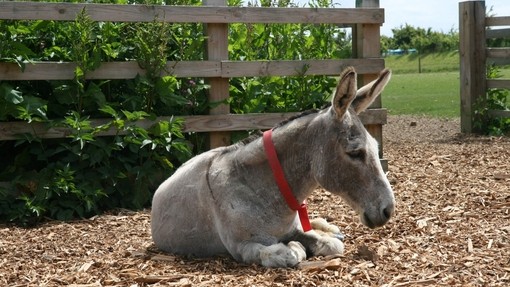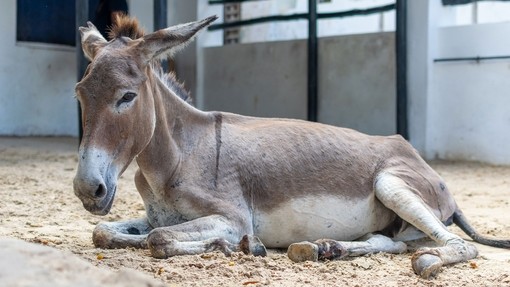Which insects affect donkeys?
Knowing what insects your donkey is susceptible to will help you decide what preventative measures to take.
Insects affecting donkeys include:
Flies, such as:
- Common house fly (Musca spp.)
- Stable fly (Stomoxys spp.)
- Horse fly (Tabanus spp.)
- Bot fly (Gasterophilus spp.)
- Midge, including Culicoides spp., black fly or gnat (Leptoconops spp.) and sand fly (Phlebotomus spp.)
- Mosquito
Lice
- For more information on what lice affect donkeys, read our resource about lice in donkeys.
How do I protect my donkey from flies?
Elderly and arthritic donkeys may be at greater risk of fly bites due to their reduced movement.
Flies are more of a problem in certain environments and conditions. Boggy land and areas of stagnant water attract flying insects, as does the presence of manure or food, especially rotting food. Flies are seen in much larger numbers in hot and humid weather, but are less of a problem in exposed windy conditions.
Signs of irritation because of flies include, excessive tail swishing, rubbing, stamping feet, and headtossing or head-shaking.
Good management is often key to reducing irritation caused by fly and midge attacks.
In some donkeys, fly bites can cause raised lumps. You may see spots of blood, particularly on your donkey’s lower limbs. Occasionally the lumps may swell and become sore. Veterinary treatment may be necessary if skin irritation becomes widespread or problematic.
It is important to reduce the impact that flies have on your donkey.
Change your donkey’s management
There are several options available:
- Remove manure frequently from stables and paddocks.
- Keep the stable environment clean. Wash and disinfect stable walls regularly, remove unwanted feedstuff, and clean water troughs.
- Provide a field shelter to offer protection during turnout, and to allow rest and refuge from the sun. Try to locate shelters in a shady and breezy location.
- Position muck heaps as far away from stables or shelters as possible.
- Try using fans in hot weather. The movement of air is unfavourable to flies.
Providing physical protection
- Use fly rugs or summer sheets to prevent flies from landing on your donkey’s coat.
- Use fly masks or fringes to keep flies away from the face and out of the ears when your donkey is grazing. Fly masks are also a useful way to prevent sunburn in pale-skinned donkeys.
- Think about using leg protection if your donkey is at risk of skin damage because of stable flies.
You can purchase donkey-specific fly masks designed to fit their ear shape.
Using fly repellent
- Apply fly repellent to the coat of your donkey. Most come in spray form and are quick and easy to apply. If spraying makes your donkey nervous, try fly repellent cream or apply the spray directly from the bottle with a grooming brush or sponge.
- Repellent preparations contain ingredients that either have a taste or smell that stops flies wanting to land on your donkey.
- Fly repellents occasionally cause an adverse or allergic reaction. Before applying a product, test it on a 5 cm patch of your donkey’s skin and wait 24 hours. If your donkey’s skin does not react, then it should be safe to apply.
- Fly repellents contain different ingredients. Chemical and herbal products are available.
- Chemical repellents normally contain substances like diethyl-meta-toluamide (DEET), or pyrethroids. There is scientific evidence to support the use of these products as an effective way of deterring flies.
- Herbal repellents normally contain a mixture of oils, including mint, eucalyptus, aniseed, cedar wood, clove, lavender, aloe vera, walnut, and sesame seed oils. The claim is that some of these oils deter flies and some reduce the itching caused by bites. Use herbal repellents with caution though, there is no current scientific evidence showing that they effectively repel flies
- Garlic is not a suitable fly repellent for donkeys. There is no scientific evidence to prove that it works, and research suggests that feeding garlic regularly may be harmful to equines.
Fly repellents are only part of the solution. Seek advice from your vet before purchasing and applying any chemical or herbal repellent.
Insecticides
Insecticides are chemicals that can kill insects when they bite. They are more frequently used against lice than flies.
Your vet may recommend the use of an insecticide (such as cypermethrin or permethrin) if insects become a problem for your donkey. However, certain insecticides can cause nasty skin reactions and some insects have resistance against them, which means they won’t work. Always follow your vet’s instructions when using insecticides.
Why are midges a particular problem for donkeys?
Midges are a type of fly. The Culicoides midge is responsible for a common skin condition known as ‘sweet itch’. This condition affects certain donkeys who are ‘hypersensitive’ (allergic) to the midge’s saliva.
Midge bites cause the donkey’s skin to constantly itch and can cause distress. The donkey will rub excessively on the areas that are most affected, especially the mane and tail. These areas often bleed and so attract more insects.
Midges can be vectors of serious infectious diseases in some countries (such as African horse sickness, a disease which can infect donkeys).
Midges are seasonal, typically seen from late March to September in the UK and many parts of Europe. Certain areas are more heavily populated than others. Cooler areas of the UK may have a shorter midge season. They tend to be more active at certain times of the day, mainly dawn and dusk, although certain conditions may extend these periods by a few hours.
Preventing irritation by midges is like that of other flies, but there are some extra points to note. These are especially important if your donkey is prone to sweet itch:
- Stable your donkey at dusk and dawn, when midges are more active. You may need to stable up to two hours before dusk and up to two hours after dawn.
- If possible, keep your donkey in a location where there are less midges:
- avoid marshy, boggy fields
- keep donkeys that are susceptible to sweet itch on more exposed, windy sites (such as hillsides or near the coast)
- chalk-based grassland often has fewer midges than clay-based grassland because of the free draining soil
- Use rugs and hoods specifically designed for sweet itch. These rugs cover the whole body, including abdomen, head, and neck. They are strong, tear-proof, and breathable to prevent overheating in the summer. Introduce sweet itch rugs before the midge season. The itching can be much harder to control once your donkey has been bitten.
- If your donkey suffers from sweet itch, speak to your vet for advice and treatment. Do not apply fly repellents or treatments before you have done this.
- It may be beneficial to give your donkey a soothing bath once a week with a suitable shampoo, providing the weather is appropriate.




